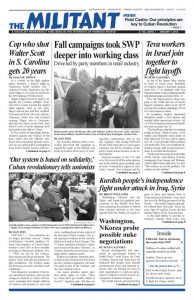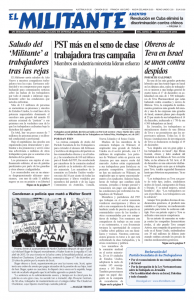Recent developments and statements by government leaders in South Korea, North Korea, the United States, Russia and China have all indicated that despite their sharply counterposed views and national interests, they are looking for ways to start negotiations to reach an agreement in relation to North Korea’s development of nuclear weapons.
The South Korean government has proposed to Washington that they put off joint military maneuvers that they have carried out annually for nearly 40 years until after the Winter Olympics and Paralympics in South Korea.
These games are scheduled to end March 18. Operation Foal Eagle, in which tens of thousands of U.S. and Korean troops practice attacking the North and “eliminating” its leadership, usually take place in February or March.
This move comes among other signs that talks are possible.
“We know that North Korea wants above all to talk to the United States about guarantees for its security,” Foreign Minister Sergey Lavrov told Secretary of State Rex Tillerson when they met on the sidelines of the Dec. 7 Vienna meeting of the Organization for Security and Co-operation in Europe, according to Russian media reports. “We are ready to support that, we are ready to take part in facilitating such negotiations.”
“We hope all relevant parties can take steps to alleviate tensions,” Chinese Foreign Ministry spokesperson Geng Shuang told the press at the meeting.
“We’re ready to talk anytime North Korea would like to talk,” Tillerson told a Dec. 12 forum in Washington. He outlined three conditions — a prior period of “quiet” in which the North Korean government does not carry out any nuclear or missile tests; that Pyongyang tell Washington it wants to negotiate; and that no North Korean tests take place during the negotiation process.
Tillerson has said that Washington has held numerous informal discussions with North Korean representatives since President Donald Trump took office.
Tillerson rejected a proposal by Moscow and Beijing — which have both carried out some of the U.N. sanctions against North Korea, but not to the extent demanded by Washington — for a “freeze-for-freeze.” This means that North Korea would suspend nuclear and missile tests, but not get rid of its existing nukes, in exchange for a moratorium on U.S. military maneuvers.
At the same time Washington has used the U.N. Security Council to ramp up sanctions — and demanded that allies and rivals alike join in — to try to get North Korea to accept U.S. dictates and abandon its nuclear weapons and intercontinental missile program.
Tillerson told a Security Council meeting Dec. 15 that Pyongyang is “a direct threat to our security and the security of the entire world.” Jan Song Nam, North Korea’s U.N. ambassador replied. “The U.S. has now stockpiled more than 4,000 nuclear warheads in its nuclear arsenals,” and is the worldwide “leader in nuclear proliferation.” He argued that North Korea’s nuclear arsenal is necessary in the face of U.S. threats.
After World War II, the Korean people rose up in a countrywide revolutionary movement for independence. Washington — which had thousands of troops occupying southern Korea — and Moscow divided Korea, despite the desire of the Korean people for one, united, country. While Koreans carried their revolution through in the north, the U.S. government installed a bloody dictatorship in the south, which killed thousands of workers, peasants and other opponents of imperialist domination.
Washington, under the cover of the United Nations flag, bombed much of the north into rubble during the 1950-53 Korean War, but was fought to a standstill by Korean and Chinese soldiers. Washington to this day refuses to sign a formal peace treaty with North Korea.
Since the 1940s, the Socialist Workers Party has championed the fight of Korean workers and farmers for one, united, Korea, and demands that Washington get out. The SWP also backs the demand for a nuclear-free peninsula and a nuclear-free Asia.

